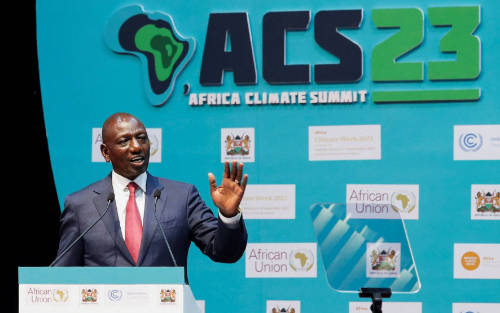Kenya Plans Sovereign Wealth, Infrastructure Funds to Curb Borrowing

TLDR
- Kenyan President William Ruto has announced plans to establish a sovereign wealth fund and an infrastructure fund to channel investment into key sectors
- Over the past decade, Kenya’s large-scale infrastructure drive has lifted growth but left it with one of Africa’s highest debt service-to-revenue ratios
- The new funds aim to mobilize domestic resources and leverage state assets to finance development more sustainably
Kenyan President William Ruto has announced plans to establish a sovereign wealth fund and an infrastructure fund to channel investment into key sectors while curbing the country’s dependence on external borrowing.
Over the past decade, Kenya’s large-scale infrastructure drive has lifted growth but left it with one of Africa’s highest debt service-to-revenue ratios. The new funds aim to mobilize domestic resources and leverage state assets to finance development more sustainably.
A recently enacted privatization law enables partial sales of state-owned enterprises, beginning with the Kenya Pipeline Company, which transports petroleum products nationwide and to neighboring countries. The share sale could raise up to KES 130 billion ($1 billion) to capitalize the two funds.
The infrastructure fund will prioritize agriculture and energy, including expanding generation capacity from 2,300 megawatts to over 12,000 MW to power industrial growth. Ruto did not specify the operational timeline for the funds.
Daba is Africa's leading investment platform for private and public markets. Download here
Key Takeaways
Kenya’s move to launch sovereign and infrastructure funds marks a strategic pivot from debt-financed growth toward asset-backed and investment-driven development. The plan underscores President Ruto’s effort to rebuild fiscal discipline amid mounting debt-servicing costs and limited access to concessional loans. By monetizing public assets — starting with the Kenya Pipeline Company — the government hopes to attract private capital and boost transparency in infrastructure financing. The focus on agriculture and energy highlights a pragmatic shift toward sectors that can drive exports and job creation while reducing fiscal vulnerability. However, successful implementation will hinge on robust governance frameworks and credible fund management to avoid the pitfalls that have undermined similar initiatives across Africa. If executed effectively, the twin funds could reposition Kenya as a model for self-financed growth and restore investor confidence in the country’s long-term fiscal sustainability.

Next Frontier
Stay up to date on major news and events in African markets. Delivered weekly.
Pulse54
UDeep-dives into what’s old and new in Africa’s investment landscape. Delivered twice monthly.
Events
Sign up to stay informed about our regular webinars, product launches, and exhibitions.




